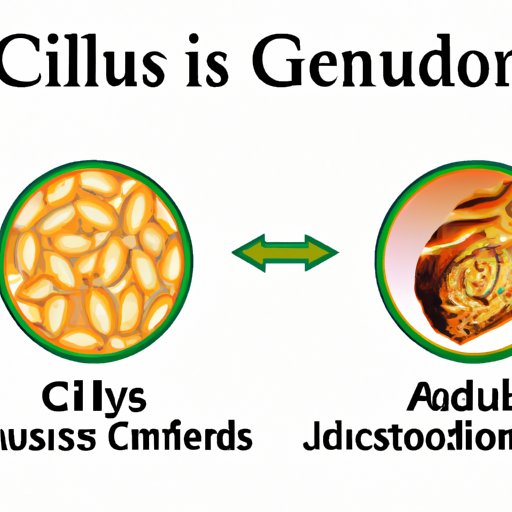
Introduction
Celiac disease, also known as gluten-sensitive enteropathy, is an autoimmune disorder that affects the digestive system. It is estimated that around 1 in 100 people worldwide have this disorder, but many are unaware of it. Early diagnosis and treatment are crucial to managing the condition and preventing long-term complications. In this article, we will explore the signs and symptoms of celiac disease, how it affects the digestive system, how to get diagnosed, and more.
Signs and Symptoms of Celiac Disease
Celiac disease is a condition that damages the lining of the small intestine, which can cause a wide range of symptoms. Common signs and symptoms of celiac disease include diarrhea, constipation, abdominal pain, bloating, fatigue, weight loss, and anemia. It’s important to note that not everyone with celiac disease experiences these symptoms. Some people may have no symptoms at all, while others may have symptoms that are not related to digestion, such as joint pain, skin rashes, or headaches.
Celiac disease can affect the body in different ways. In some cases, it can lead to malabsorption of important nutrients, such as iron, calcium, and vitamins A, D, and K. Over time, this can cause problems such as osteoporosis, infertility, or neurological disorders. In children, celiac disease can lead to growth problems and developmental delays.
If you have any of these symptoms, it’s important to take them seriously and seek medical advice. Your doctor may recommend you to a gastroenterologist, who can perform various tests to diagnose celiac disease.
Link Between Digestive Health and Celiac Disease
The digestive system is responsible for breaking down food and absorbing nutrients. In people with celiac disease, the immune system reacts to gluten, a protein found in wheat, barley, and rye, which leads to inflammation and damage to the small intestine.
People with celiac disease are also more likely to have other digestive disorders, such as lactose intolerance, irritable bowel syndrome (IBS), or inflammatory bowel disease (IBD). This is because the damage to the small intestine can impact the way it processes other foods besides gluten.
It’s important to understand the connection between gluten and celiac disease so that you can make informed decisions about your diet and your health.
How to Get Diagnosed with Celiac Disease
Getting diagnosed with celiac disease requires a few steps. It’s important to continue eating gluten-containing foods until all tests are completed, as removing gluten from your diet can interfere with diagnostic accuracy.
The first step is usually a blood test, which looks for certain antibodies that are present in people with celiac disease. If the blood test is positive, your doctor may recommend further testing, such as an endoscopy. During the endoscopy, a gastroenterologist will examine the lining of your small intestine and take a biopsy to check for signs of damage.
Preparing for a visit with a doctor or gastroenterologist involves reviewing your medical history, understanding the symptoms you have been experiencing, and any diet changes you may have had. This will allow the doctor to better understand your condition from a holistic perspective and recommend the necessary diagnostic tests that will provide clarity on the matter.
Common Myths and Misconceptions about Celiac Disease Debunked
There are many myths surrounding celiac disease, and believing them can have serious consequences for those with the condition. These myths include thinking that celiac disease is only a digestive disorder or that it only affects children. Another common myth is that celiac disease is a food allergy, when in reality it is an autoimmune disorder.
It’s important to understand the truth about celiac disease to help break down these myths. Celiac disease can affect anyone, at any age. It also has a genetic component, meaning that it can run in families. The only treatment for celiac disease is a gluten-free diet, and not taking the condition seriously can lead to long-term health complications.
Celiac Disease and Gluten Intolerance: Knowing the Difference and Similarities
Gluten intolerance, also known as non-celiac gluten sensitivity, is a condition where a person experiences symptoms similar to celiac disease when eating gluten. However, unlike celiac disease, gluten intolerance does not cause the same degree of damage to the small intestine.
While gluten intolerance can lead to celiac disease, not all people with gluten intolerance will develop celiac disease. It’s important to understand the difference between the two and to seek medical advice if you suspect you may have either condition.
A gluten-free diet can benefit both celiac disease and gluten intolerance, as it removes the trigger for both conditions and can improve overall digestive health.

Celiac Disease and its Relationship with Other Autoimmune Disorders
An autoimmune disorder is a condition where the immune system attacks the body’s own tissues. Celiac disease is an example of an autoimmune disorder that affects the digestive system. However, it is also associated with other autoimmune disorders, such as type 1 diabetes, thyroid disease, and rheumatoid arthritis.
It’s unclear why there is a connection between celiac disease and other autoimmune disorders, but it’s believed that genetics and environmental factors such as stress, infections, and lifestyle choices can influence their development.
Tips on Maintaining a Gluten-Free Diet for Individuals with Celiac Disease
For people with celiac disease, following a gluten-free diet is the only treatment. This means avoiding all foods that contain gluten or are contaminated with gluten. Foods that are safe to eat include fruits, vegetables, protein sources like meats and fish, and gluten-free grains such as rice and corn.
It can be challenging to maintain a gluten-free diet, but there are resources available to help make it easier. These include gluten-free cookbooks and recipe websites, support groups, and nutritionists. It’s important to read food labels carefully when grocery shopping and to communicate your needs with restaurants or when eating out.
Conclusion
Celiac disease is a serious autoimmune disorder that affects the digestive system and can have long-term health complications if left untreated. Recognizing the signs and symptoms, understanding the diagnostic process, and following a gluten-free diet are crucial to managing the condition. Even if you don’t have celiac disease, it’s important to understand the relationship between gluten, digestive health, and overall wellness, and to seek medical advice if you have concerns.
To stay healthy and manage your condition, work closely with your doctor, gastroenterologist, and other support resources. With proper care and attention, you can live a healthy, happy life with celiac disease.





